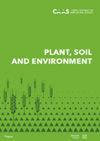Isolation of bacterial strains for efficient degradation of organophosphate pesticide
IF 1.8
3区 农林科学
Q1 AGRONOMY
引用次数: 0
Abstract
Regular use of organophosphate pesticides (OPPs) such as chlorpyrolifos in agriculture results in a variety of environmental issues, including groundwater contamination, surface water pollution, enhanced floral and faunal resistance, soil acidity, reduced soil fertility, and nitrate leaching. The objective of the current study was to identify and isolate bacterial strains from native soil that could degrade chlorpyrifos and had high pesticide resistance. A total of 60 distinct microbial strains were isolated from the soil samples and subsequently evaluated for their capacity to degrade chlorpyrifos. Serratia liquefaciens, one of the strains, was discovered to be the most effective among them for degrading chlorpyrifos. It was subsequently examined for the biodegradation of chlorpyrifos under various environmental conditions and was then identified using 16S rRNA sequencing. The strain S. liquefaciens degraded more than 90% of 50 mg L-1 of chlorpyrifos. The strain performed better when urea and sucrose were used as nitrogen and carbon sources, respectively. At a temperature of 35 °C and a basic pH range, the strain functioned exceptionally well. The finding demonstrated that the bacterial strain S. liquefaciens, which was isolated from agricultural soil, is a top contender for cleaning up OPP-contaminated soil.高效降解有机磷农药菌株的分离
在农业中经常使用有机磷农药(OPPs),如氯吡虫啉,会导致各种环境问题,包括地下水污染、地表水污染、植物和动物抗性增强、土壤酸性、土壤肥力降低和硝酸盐浸出。本研究的目的是从土壤中鉴定并分离出能降解毒死蜱并具有高抗药性的菌株。从土壤样品中共分离出60种不同的微生物菌株,随后评估了它们降解毒死蜱的能力。其中一株液化沙雷菌对毒死蜱的降解效果最好。随后检测了毒死蜱在各种环境条件下的生物降解,然后使用16S rRNA测序进行鉴定。液化链球菌对50 mg L-1毒死蜱的降解率超过90%。以尿素和蔗糖分别作为氮源和碳源时,菌株表现较好。在35°C的温度和基本的pH范围内,菌株的功能非常好。这一发现表明,从农业土壤中分离出的液化链球菌是清理opp污染土壤的首选菌株。
本文章由计算机程序翻译,如有差异,请以英文原文为准。
求助全文
约1分钟内获得全文
求助全文
来源期刊

Plant, Soil and Environment
Agronomy, Soil Science-农艺学
CiteScore
4.80
自引率
4.20%
发文量
61
审稿时长
2.4 months
期刊介绍:
Experimental biology, agronomy, natural resources, and the environment; plant development, growth and productivity, breeding and seed production, growing of crops and their quality, soil care, conservation and productivity; agriculture and environment interactions from the perspective of sustainable development. Articles are published in English.
 求助内容:
求助内容: 应助结果提醒方式:
应助结果提醒方式:


